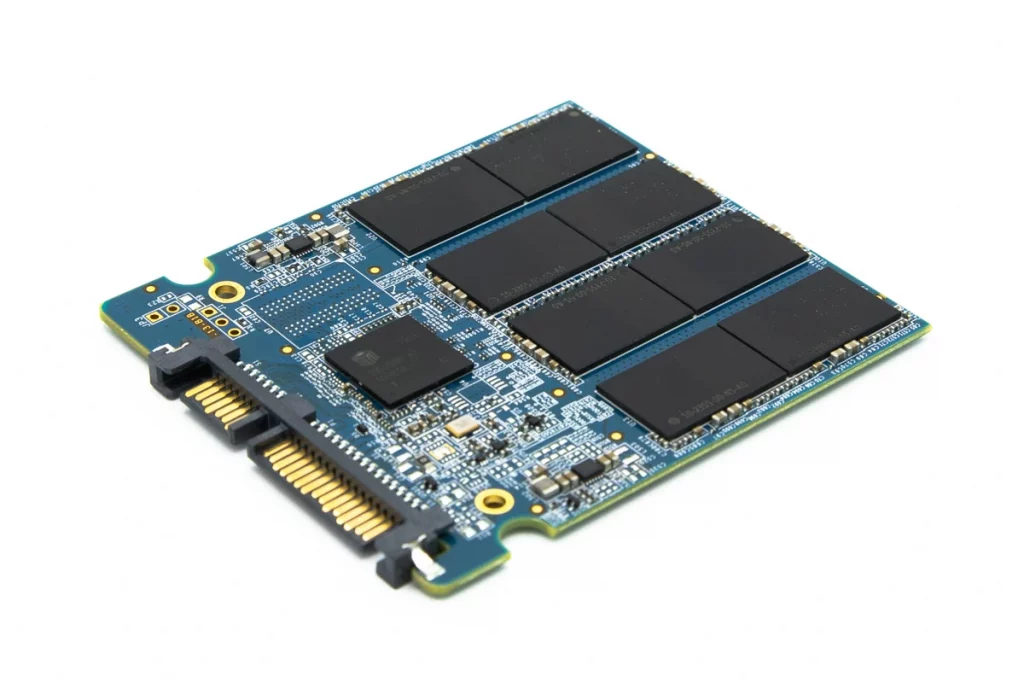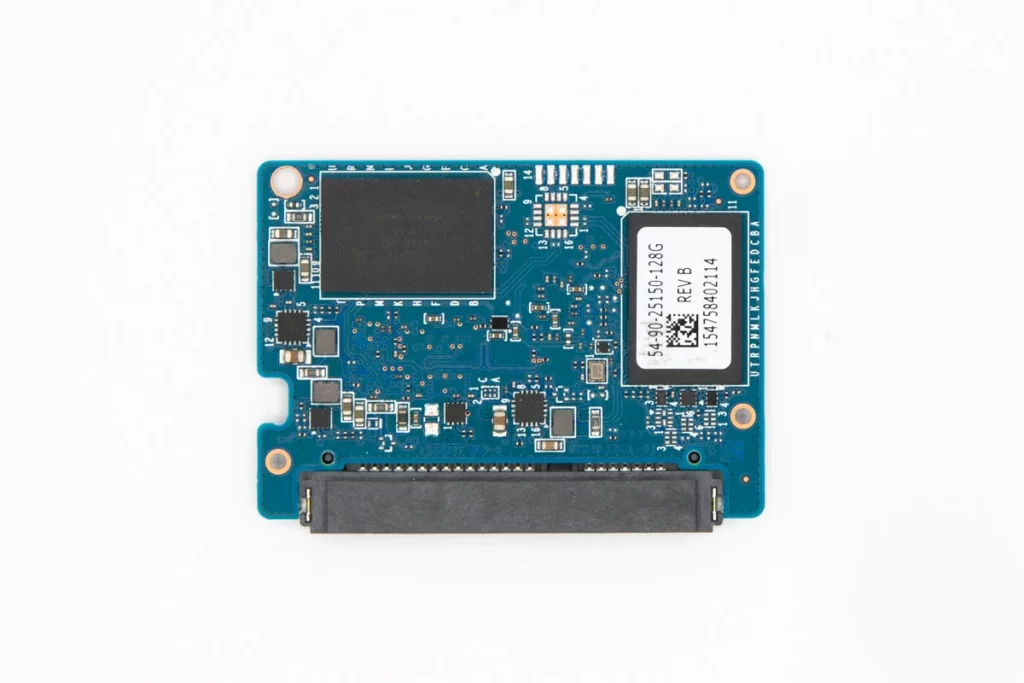Solid State Drives (SSDs) are an essential component in modern computing. They are fast, reliable, and efficient, making them a popular choice for storage media. However, like any other electronic device, SSDs are not immune to corruption, and the consequences can be devastating.
In this blog post, our team will explore the symptoms, reasons, and solutions to a corrupted SSD.
Can SSD Get Corrupted? Corrupted SSD Causes
There are various reasons why an SSD may become corrupted. Some of the most common reasons include the following:
- Physical Damage. SSDs are vulnerable to physical damage. Dropping a laptop or exposing an SSD to extreme temperatures or moisture can cause damage to the device.
- Firmware Issues. Firmware is the software that controls the SSD’s functionality. Firmware issues can cause an SSD to become corrupted, leading to data loss.
- Power Failures. Power outages can cause data corruption in any electronic device, including SSDs.
- Virus and Malware. Viruses and malware can damage your SSD by corrupting files, altering data, and causing other issues.
- Overheating is a common cause of SSD corruption. When an SSD overheats, it can corrupt data and cause other issues.
SSD Corruption Symptoms
Various symptoms indicate a corrupted SSD. Some of the most common warning signs include:
- Slow Performance. A corrupted SSD can cause your computer to slow down significantly, and programs may take longer to launch than usual.
- Frequent Crashes. When an SSD is corrupted, it may cause frequent crashes, making it difficult to use your computer.

- Blue Screen of Death (BSOD). If your computer suddenly crashes and displays a blue screen of death, it may indicate a corrupted SSD.
- Failure to Boot. When an SSD is corrupted, your computer may fail to boot, and you may see an error message indicating that the operating system cannot be found.
- Disappearing Files. If files suddenly disappear from your computer or become inaccessible, it may indicate a corrupted SSD.
Preventing SSD Corruption
Prevention is always better than cure. Here are some tips to help prevent SSD corruption:
Use Surge Protectors. Power outages can cause data corruption in SSDs. Hence, use a surge protector to protect your computer and SSD from power surges and outages.
Avoid Overheating. Overheating can cause SSD corruption. Ensure your computer is adequately ventilated, and avoid exposing your SSD to high temperatures.
Update Firmware Regularly. Update your SSD firmware to avoid any bugs or issues that may cause corruption.
Backup Your Data Regularly. Back up your data regularly to avoid data loss in the event of an SSD failure.
Use Antivirus Software. Use antivirus software to protect your computer and SSD from viruses and malware that can cause data corruption.
A corrupted SSD can be a frustrating and devastating experience. Nevertheless, by understanding the symptoms and reasons for a corrupted SSD, you can take steps to fix the SSD corruption problem.
How to Fix a Corrupted SSD?
There are various solutions to a corrupted SSD, depending on the severity of the damage. Here are some of the most effective solutions:
Check the SSD Health
Checking the health of your SSD can help you determine the extent of the damage. Third-party software can help you check the health of your SSD and identify any bad sectors or other issues.
Back up Your Data
If your SSD is severely damaged, it may not be possible to recover your data. Therefore, it is essential to back up your data regularly to avoid losing it in the event of an SSD failure.

Use Chkdsk
Chkdsk is a Windows tool that checks the file system and the hard drive’s physical surface for errors. You can use chkdsk to repair any bad sectors on your SSD.
Reformat the SSD
Reformatting your SSD can fix any file system errors and help restore the SSD’s functionality. However, this solution should only be used as a last resort, as it will erase all data on the drive.
Update Firmware
Updating the firmware on your SSD can fix any bugs or issues causing the corruption. Check the manufacturer’s website for any firmware updates and follow the instructions carefully.
Contact a Professional
If your SSD is severely damaged, it may require the assistance of a professional data recovery service. These services have specialized equipment and software that can recover data from damaged SSDs.
Corrupt SSD Recovery with PITS
PITS Global Data Recovery Services is a professional data recovery company that provides advanced and reliable data recovery solutions for various types of storage devices, including hard disk drives and solid-state drives (SSDs). We understand the importance of data in today’s digital age and the devastating impact of data loss on individuals and businesses. Therefore, our team offers specialized services to recover data from a corrupted SSD.
Our team of highly trained technicians can use specialized methods to diagnose the extent of the damage to the SSD. We can also identify the cause of the corruption and the number of bad blocks on the SSD. Based on this information, our technicians will determine if the data is recoverable.
If the SSD has physical damage, we can repair it in our state-of-the-art labs. Our technicians have the expertise and experience to repair or replace faulty components and restore the SSD’s functionality.
Our data recovery process involves extracting data from a corrupted SSD. Technicians at PITS use advanced techniques to recover data from bad sectors, damaged files, and other issues that may be causing data loss. We ensure that your data is restored with the utmost confidentiality and security.
At PITS Global Data Recovery Services, we have a high success rate in recovering data from corrupted SSDs. Our technicians are highly trained and have the expertise to handle all types of SSD models, brands, and sizes.
We understand that time is of the essence when it comes to data recovery. Therefore, our company offers emergency data recovery services for clients who need their data recovered urgently.
With our extensive network of locations, we provide our services in Brooklyn, Houston, Carrolton, Pasadena, and many other cities. Our locations page provides more information about our drop-off points and offices.
Data loss can be a frustrating and stressful experience, but with PITS Global Data Recovery Services, you can be confident that your data is in safe hands. We provide advanced and reliable data recovery solutions for corrupted SSDs, ensuring that your data is recovered with the utmost confidentiality and security.
Instead of using data recovery software, contact us today for a consultation and find out how we can help you recover your data.
Frequently Asked Questions
What are the common symptoms of a corrupted SSD?
Common symptoms of a corrupted SSD include frequent crashes, slow boot times, read/write errors, files becoming inaccessible or disappearing, the system failing to recognize the SSD, and frequent “blue screen of death” (BSOD) errors.
Why does my SSD become corrupted?
SSD corruption can occur due to various reasons, including sudden power losses, firmware bugs, malware attacks, excessive write/erase cycles, software errors, and physical damage to the SSD.
Can a virus cause SSD corruption?
Yes, malware and viruses can infect and corrupt files stored on an SSD, potentially leading to the SSD’s malfunction or complete failure.
How do power outages affect SSDs?
Power outages or improper shutdowns can interrupt data writing processes, leading to incomplete or corrupted data on the SSD, which can cause the SSD to become corrupted over time.
Is there a way to prevent SSD corruption?
While it’s impossible to prevent SSD corruption completely, you can minimize the risk by using reliable antivirus software, ensuring proper power supply and surge protectors, updating firmware regularly, and following recommended guidelines for SSD usage and data backup.
